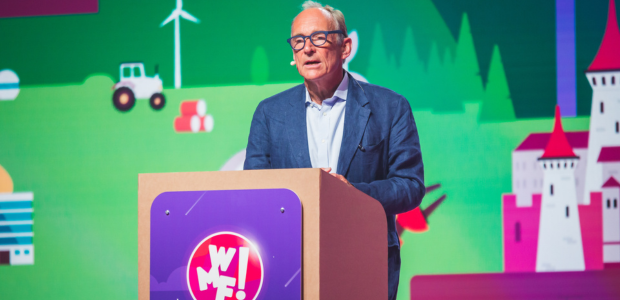
Digital Sovereignty and the New Era of the World Wide Web: Sir Tim Berners-Lee speaks at WMF
Sir Tim Berners-Lee arrived in Italy for the WMF - We Make Future event on June 16th. The eminence of IT and inventor of the World Wide Web accompanied the participants of the eleventh edition of WMF, the International Trade Fair, and Festival on Tech and Digital Innovation, which took place from June 15th to 17th at the Rimini Expo Center (Italy), on a journey through time and into the future of the Web and humanity.
From the Mainstage of the event, Sir Tim Berners-Lee wanted to retrace the different stages of development of the WWW as we know it today, starting from its beginnings, explaining how the project, in its original intentions, was based on sharing and openness. "We thought of breaking down borders and barriers for people all over the world, promoting connection and understanding of cultures" he explained to a crowded audience of over 5.000 people. "Thanks to technologies, many useful things have been accomplished. Think of Wikipedia, where volunteers work together to increase knowledge for everyone. Think of OpenStreetMap; open source is very important. Think of the earthquake in Haiti; immediate map updates were made."
And he continued:
"However, we cannot say that this openness still exists: there are real problems when someone is endangered through the web, facing abuse, threats, [...] We need to find a balance between freedom of expression and the spread of fake news. We must protect the rights and data of citizens, think about the LGBTQ community. We should be able to use the web without anyone controlling it, but at the same time, there must be control to safeguard individuals, their data, and legality. There should be transparency and clarity at the legislative level regarding the collection and sharing of sensitive data."
Indeed, Sir Tim Berners-Lee also shed light on the critical factors introduced by the Web, often focusing on the use and protection of personal data. "There are often centralized systems - think of Facebook and Google - that are not open source and work in silos. The functionalities are great, but often things don't go as they should: privacy, security, tracking, these are still very problematic issues."
Regarding the integration of AI into our lives and even within the web and its dynamics, Sir Tim Berners-Lee offers food for thought: "AI will become incredibly powerful, but you must have sovereignty over your data, control over the data you provide. Chatbots should work for you, not exploit you. AI should work for you as individuals, citizens, and consumers."
At the conclusion of his talk, Sir Tim Berners-Lee returns to the fundamental concepts of the web, those on which he created it back in '98, emphasizing their importance and the absolute necessity for a better society and future. "We must think about building, not polarizing, as we did at the beginning of the journey of creating the World Wide Web. In this third era, we must therefore work towards increased collaboration, creativity, and cooperation. Today, we must address the world's problems: climate change, democracy [...] in this third era of the web, we must consider these things, and the web could become our ideal tool," he concludes. "We must build and create systems that ensure compassion and empathy towards others, considering everyone: people of different ethnicities, cultures, orientations, and identities."
In complete alignment with the values upheld and promoted since the first edition of WMF - We Make Future, Sir Tim Berners-Lee's speech concluded with a strong message, offering anyone who had the opportunity to listen to it live from the main stage of the event the impetus for a different approach to the web, its tools, and its infinite possibilities.

